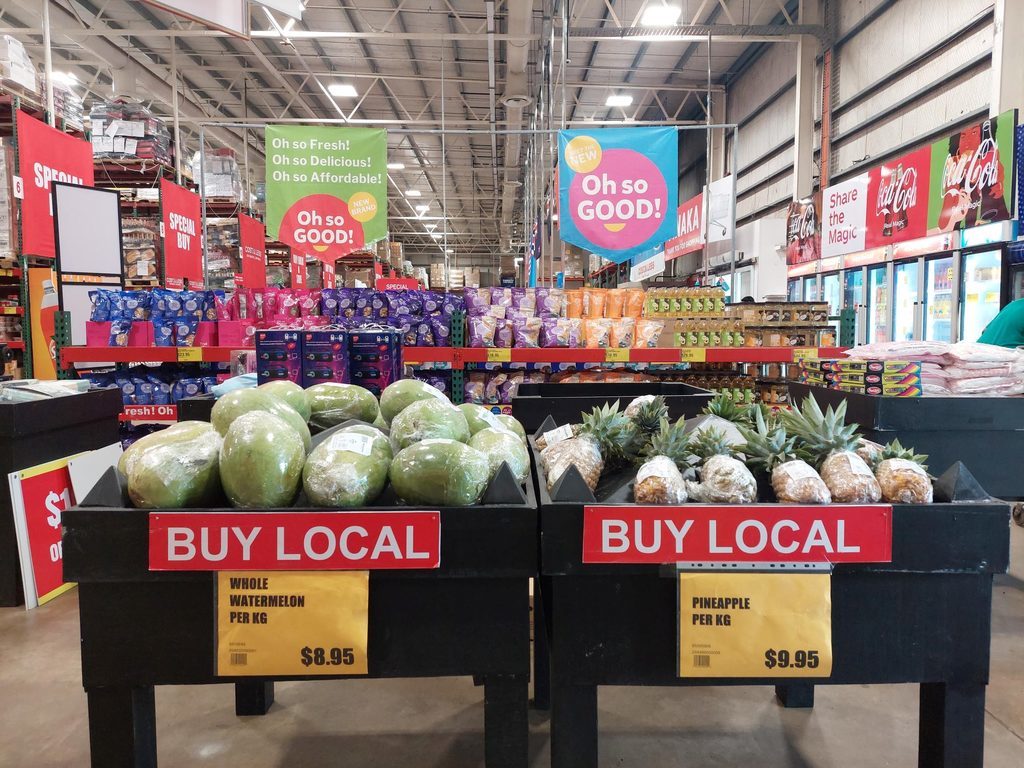Bula vinaka shoppers, when we think about our weekly shopping, we often focus on what’s on special or how to make our groceries last. But there’s a bigger picture that affects every household across the Pacific — food security.
Food security simply means having access to enough safe, nutritious, and affordable food to live a healthy life. It’s about ensuring our families — and future generations — always have something to eat, even when times are tough.
Here in the Pacific, our island nations face unique challenges. We rely heavily on imported food — from rice and flour to canned goods — which means that any rise in global prices or shipping delays quickly affects what ends up on our shelves and tables.
Climate change is another growing concern. Cyclones, floods, and droughts often damage crops and reduce local production, making it harder for farmers to supply fresh produce at affordable prices. That’s why it’s important for us, as shoppers to support local food systems.
When we buy from farmers and markets, we’re not just getting fresher food — we’re also strengthening Fiji’s ability to feed itself.
Every bundle or heap of rourou, dalo, tavioka, vudi and lemons we buy helps farmers stay in business and keeps money circulating within our communities.
Households can also play their part in small ways.
Start a backyard garden or plant a few pots of herbs, tomatoes, or chillies. Store food well to prevent spoilage, and plan meals to make the most of what you already have. These simple habits stretch the family’s budget and reduces dependence on imported foods.
Food security isn’t just a government or farmer issue — it’s everyone’s business. It begins with how we shop, cook, and care for the land that feeds us. By choosing local food, reducing waste, and being mindful of what we buy, we can all help build a stronger, more secure food future for us all.
After all, the choices we make today can help ensure our children never go hungry tomorrow.
Recently, Manoa Kamikamica, delivered a keynote address at the World Food Forum 2025 and the Hand-in-Hand Initiative Investment Forum hosted by the Food and Agriculture Organization (FAO) of the United Nations in Italy.
Kamikamica shared that Pacific innovation was deeply rooted in community knowledge, collective resilience, and cultural values.
He said traditional practices and modern technology, were helping build adaptive and climate-resilient food systems across the region.
He cited Digital Earth Pacific program, which uses satellite data to monitor coastal change, soil health, and climate impacts. This allows communities to make science-based decisions while strengthening traditional systems like agroforestry, intercropping, and rotational planting.
FAO director-general Dr Qu Dongyu supported the need for stronger partnerships to tackle the climate–agriculture link.
“Working together can be challenging,” he said, “but no one can change the size of the value chain alone.”
He urged countries to build trust, align strategies, and create practical, solutions.
Kamikamica said Pacific communities have long understood the interconnectedness of ecosystems — from reef to river, from farmer to fisher.
Through platforms such as the Pacific Heads of Agriculture and Forestry Services and the SIDS Solutions Platform, local innovations are being shared to strengthen regional resilience.
He said women, youths, and micro, small and medium enterprises (MSMEs) should be at the centre of agrifood transformation, as they are “the heartbeat of resilience and innovation in the Pacific.
The Pacific may be small, but we have solutions.
“Investing in Pacific agrifood resilience is not an act of charity — it is a strategic global investment in climate stability and food security.”
He called on the FAO and the international community to bridge the gap between climate finance and frontline communities.
He reaffirmed Fiji’s commitment to this transformation through public–private–people partnerships, the revival of the co-operative movement, and investments in climate-smart agriculture, including indigenous crops such as breadfruit and dalo.
As the world prepares for COP30 in Brazil, Kamikamica said the Pacific must be heard — not as victims of the climate crisis, but as leaders with solutions.
His message serves as a timely reminder to us all — that food security doesn’t begin in boardrooms or conference halls, but in our homes, markets, and local farms.
Every time we buy local produce, support small growers, or waste less food, we are doing our part to strengthen our food future.
So, next time you fill your basket, remember: your choices can help keep Fiji fed, resilient, and thriving now and in the future. be a responsible shopper!



